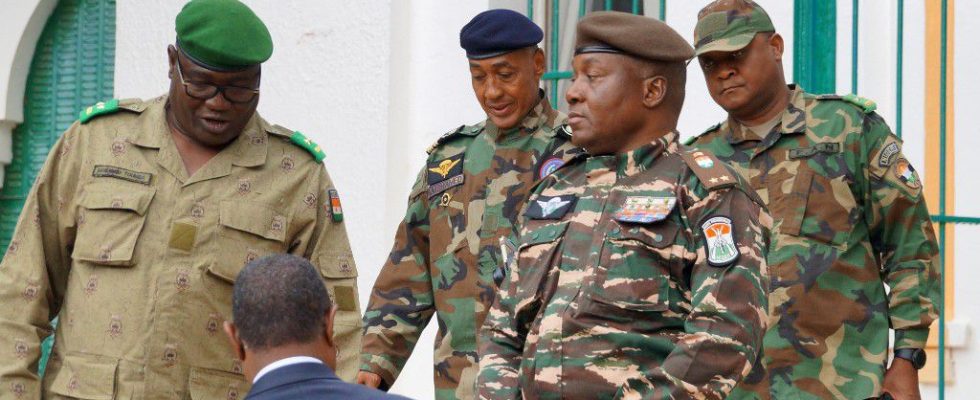The West African neighbors of Niger opposed to the coup d’etat in this country denounced Monday August 14 “a new provocation” of the military regime after its threat to prosecute for “high treason” the ousted president Mohamed Bazoum, the United States saying “dismayed”. Shortly after these convictions, the military in power in Niamey announced that they had recalled Niger’s ambassador to Abidjan after remarks by Ivorian President Alassane Ouattara, accused of having “advocated armed action against” the country.
On Sunday, the military regime claimed to have gathered “evidence to prosecute before national and international authorities” Mohamed Bazoum for “high treason” and “undermining the security” of the country. He based his accusations on his “exchanges” with “nationals”, “foreign heads of state”, and “responsible for international organizations”.
This approach “constitutes a new form of provocation and contradicts the will attributed to the military authorities of the Republic of Niger to restore constitutional order by peaceful means”, reacted the Economic Community of West African States (ECOWAS ).
“We are extremely dismayed by the information according to which we add a notch to the unjust detention of President Bazoum”, for its part reacted the State Department in Washington, estimating that this “will certainly not contribute to a peaceful resolution of this crisis”. The United States was with France a major partner of Niger before the coup. The two countries are deploying some 2,600 soldiers there in the fight against the jihadist groups which have been undermining this country for years and, beyond, a large part of the Sahel.
“Calm tensions down”
The threats from the new masters of Niger came after the reception, on Saturday in Niamey, of a delegation of Nigerian Muslim religious leaders, led with the agreement of Nigerian President Bola Tinubu, also at the head of ECOWAS, to “appease tensions created by the prospect of military intervention”.
Thursday in Abuja, the leaders of ECOWAS had reaffirmed favoring the diplomatic channel to restore President Bazoum to his functions, while ordering the deployment of the “standby force” of the organization, without revealing the timetable or the modalities of possible intervention.
On his return from Abuja, Ivorian President Alassane Ouattara declared that the heads of state agreed that a military operation “start as soon as possible”. The military regime in Niamey on Monday denounced Alassane Ouattara’s “eagerness” to “see this absolutely illegal and senseless aggression against Niger take place” and recalled the country’s ambassador to Abidjan “for consultation”.
At a previous summit on July 30, ECOWAS imposed heavy financial and trade sanctions on Niger, which is highly dependent on foreign partners, and gave the perpetrators of the July 26 coup d’etat a seven-day ultimatum – not applied – to restore constitutional order, on pain of using armed force.
“Pogroms”
Niger is in a position to “overcome” these sanctions, assured Monday Ali Mahaman Lamine Zeine, the Prime Minister appointed by the military regime. “We believe that even though this is an unfair challenge that has been imposed on us, we should be able to overcome it. And we will overcome it,” he told German state media Deutsche Welle.
Nigeria and ECOWAS are important partners, he said, warning them however: “If we see that the political and military principle comes to the fore, instead of this economic solidarity, it would be very regrettable. “.
The military regime on Sunday denounced “the illegal, inhuman and humiliating sanctions of ECOWAS”.
Mohamed Bazoum, held in his presidential residence since the day of the coup with his son and his wife, had declared in several media to be a “hostage”, deprived of electricity and forced to eat only rice and pasta, before receiving a visit from his doctor, who “did not raise any problem as to his state of health” according to the soldiers.
The head of diplomacy of Mohamed Bazoum for his part affirmed that “currently in Niamey (…) there are pogroms with hordes of young people excited by racial and ethnic hatred”, without providing evidence or specifying who would be targeted by these “pogroms”. The Maison de la presse du Niger, an association bringing together journalists, expressed concern about the “growing insecurity” in which they exercise their profession, suffering “pressure, threats” and “intimidation”.
